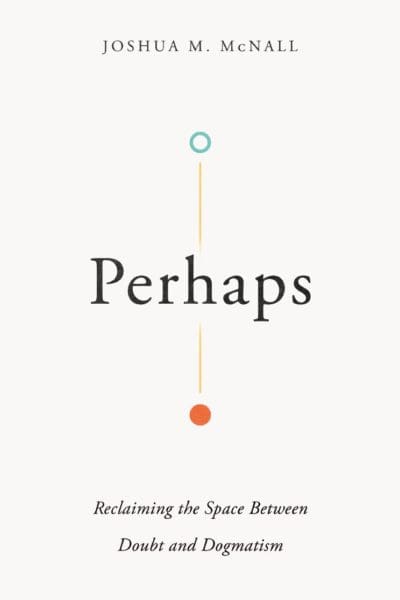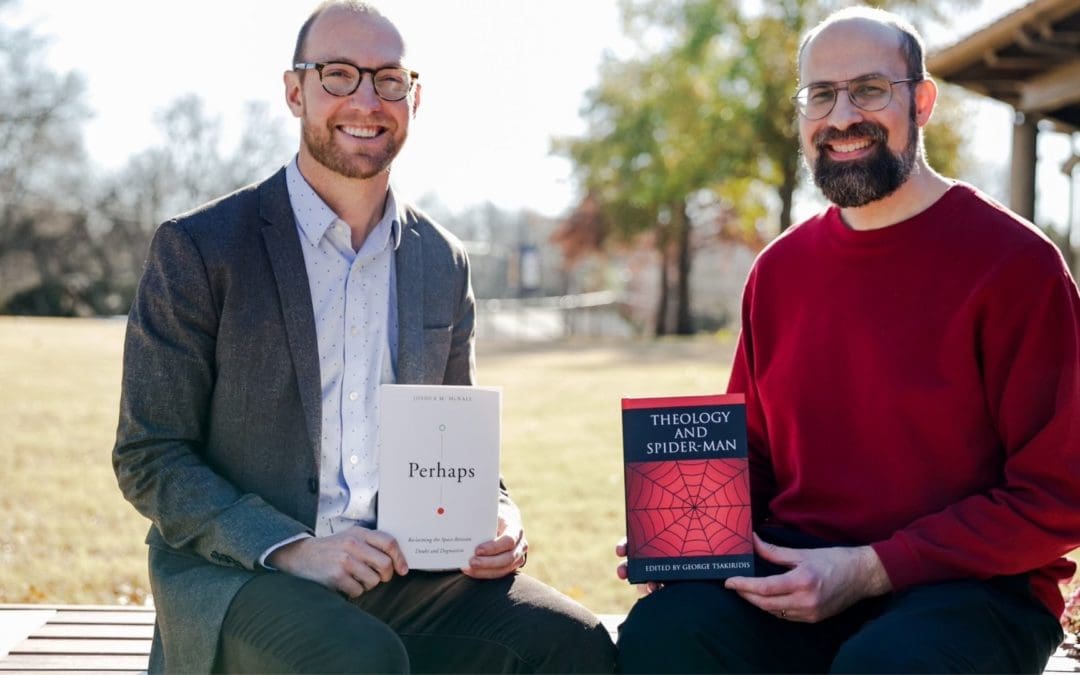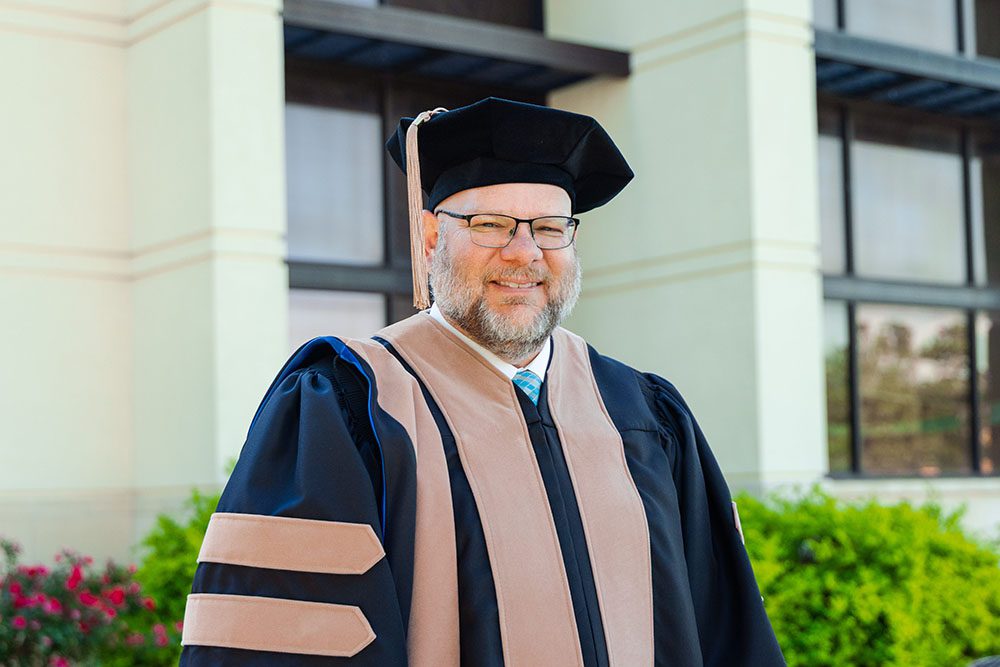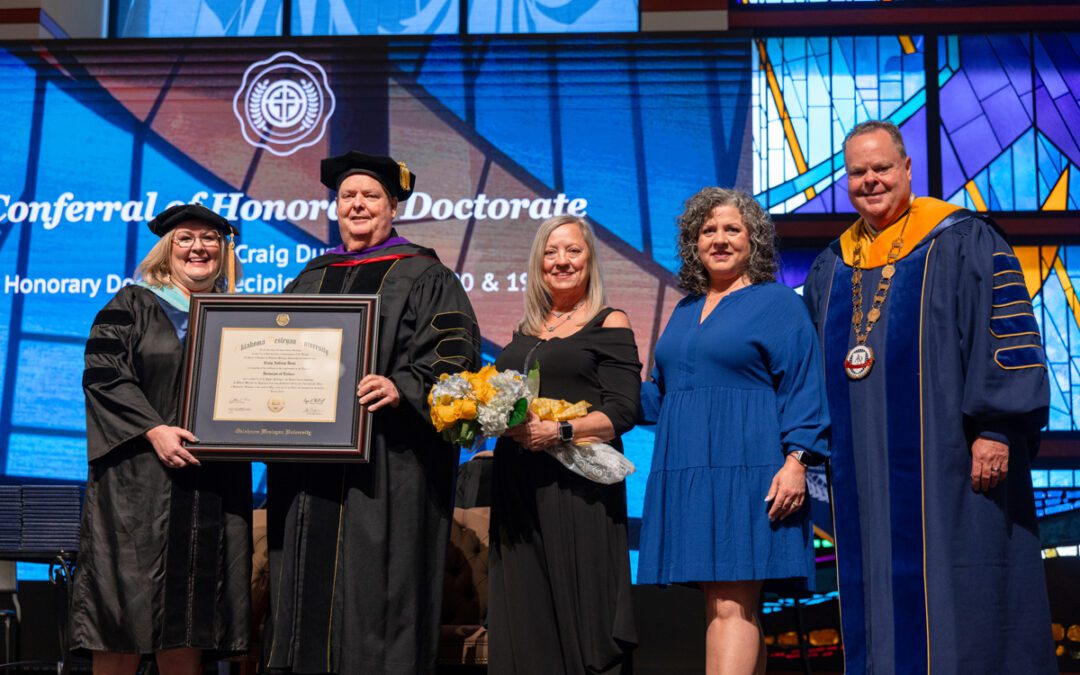For Dr. Josh McNall, the connection between his writing and his teaching is simple. “If you’re not reading and researching, then you’re probably not learning,” he said. “And professors need to learn, too.”
This central tenet within OKWU’s School of Ministry and Christian Thought is an idea that both McNall and Dr. Jerome Van Kuiken take seriously, as evidenced by their respective recent releases. Dr. Van Kuiken contributed a chapter to the compilation Theology and Spider-Man, published in November, while McNall’s latest—Perhaps: Reclaiming the Space Between Doubt and Dogmatism—was released in September.
While different in scope and subject, both projects help the professors hone their academic instincts and remain fresh in the classroom. “Writing and publishing helps me to keep up with what’s going on in the field of theology, which then affects what I teach my students,” Van Kuiken said.
“I’ve become even more convinced that American evangelicalism needs to return to Jesus as the focus of our faith—even as we wrestle with questions that we can’t always answer.”
The Space Between
The idea for McNall’s work came from watching Christianity in America grapple with itself in these recent tumultuous years, as he began to identify factions emerging in competition with each other.
“Perhaps emerged out of a basic observation: American Christianity is fracturing,” he said. “One faction of the church is increasingly identified with a kind of narrow and politicized dogmatism, while another faction drifts toward doubt and disillusionment. I wanted to speak to that divide by way of a reinvigorated Christian imagination that engages with theology, in conversation with culture and with the arts.”

Perhaps is available through InterVarsity Press.
The premise of the book is an interesting question—is all uncertainty bad?—and one that provided the idea for the title of the book. Perhaps not. That uncertainty is not an easy space to live in, admittedly; it requires brutal honesty, difficult hopefulness, and the willingness to ask tough questions. But McNall’s book explores the value in embracing this “perhaps” space.
During the writing process, McNall says he came to understand the commonalities between both sides of the factions he identified. “I’ve come to believe that both crippling doubt and angry dogmatism often share a common core,” he said. “It’s a need for certainty over Jesus, and it’s a willingness to be conformed to the image of our culture rather than the image of God’s Son… I’ve become even more convinced that American evangelicalism needs to return to Jesus as the focus of our faith—even as we wrestle with questions that we can’t always answer.”
“What surprised me was how beautifully it all came together and how much fun I had writing this chapter.”
Superhero Studies
Van Kuiken’s path to the Theology and Spider-Man project came about a bit differently. He saw the project on Facebook and thought it looked intriguing, eventually submitting a proposal and being accepted. His chapter tackles the Spider-Man film trilogy from the early 2000s, starring Tobey Maguire, examining how those movies illustrate the three sources of sin in Christian theology: the world, the flesh, and the devil. On the whole, he says it was a fun introduction to a new and as-yet unfamiliar academic discipline—superhero studies. It was also perfectly timed for the release of the newest Spider-Man film.
While there are always a number of challenges with any writing project, Van Kuiken points specifically to the demands of the different audiences his chapter had to appeal to. “[It] had the challenge of addressing different types of readers simultaneously,” he said. “On the one hand, it needed to be understandable to those who either hadn’t seen the movies or who weren’t familiar with Christian theology or superhero studies. On the other hand, it couldn’t come across as patronizing or too superficial. The chapter had to be interesting to novices, fans, and scholars alike. But what surprised me was how beautifully it all came together and how much fun I had writing this chapter.”
McNall had a similar challenge with his book, intending Perhaps both for theologians and for college students. “It’s not a popular level book, but it’s also not just for scholars. I hope it serves the church, and particularly those individuals—including pastors—who are wrestling with their faith and with our current cultural moment,” he said.
In addition to Perhaps and Theology and Spider-Man, both McNall and Van Kuiken continue to produce resources for the church. McNall hosts his successful Outpost Theology podcast, where he interviews luminaries across the spectrum of American Christianity, and he recently submitted his newest book manuscript, dealing with the doctrine of atonement. Van Kuiken contributed a chapter to a new collected Theology and Tolkien volume, as well as a manuscript about the biblical book of Jude. Both are expected next year.
So, yes—both professors are still learning, too
For more information about OKWU’s School of Ministry and Christian Thought, click here.



